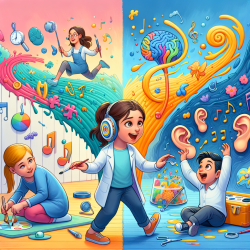Introduction
Single-sided deafness (SSD) in children can significantly impact their auditory development, affecting language skills and educational progress. Recent research published in Scientific Reports highlights the potential of consistent cochlear implant (CI) use to partially reverse the cortical effects of SSD in children. This blog explores how practitioners can leverage these findings to improve outcomes for children with SSD.
The Study: Key Findings
The study, "Consistent and chronic cochlear implant use partially reverses cortical effects of single-sided deafness in children," investigated the effects of CI use in 22 children with SSD. The research found that:
- Cortical reorganization driven by unilateral hearing can occur throughout childhood.
- Chronic and consistent CI use can partially reverse these effects.
- CI use may not protect children with late-onset SSD from ongoing deterioration of pathways from the deaf ear.
Implications for Practitioners
For speech-language pathologists and audiologists, these findings underscore the importance of early and consistent CI use in children with SSD. Here are practical steps practitioners can take to enhance auditory outcomes:
- Early Intervention: Encourage early assessment and intervention for children with SSD to maximize the benefits of CI use. Early detection and treatment are crucial for promoting bilateral auditory development.
- Consistent Device Use: Emphasize the importance of consistent daily use of the CI. The study found that children who used their CI for longer daily periods achieved more significant improvements in cortical reorganization.
- Monitor Progress: Regularly monitor the child's auditory development and adjust therapy plans as needed. Use data-driven assessments to track progress and make informed decisions about treatment strategies.
Encouraging Further Research
While this study provides valuable insights, further research is needed to fully understand the long-term effects of CI use in children with SSD. Practitioners are encouraged to contribute to this growing body of knowledge by conducting their own studies or collaborating with research institutions.
Conclusion
The research on cochlear implants in children with single-sided deafness offers hope for improved auditory outcomes. By implementing the study's findings, practitioners can help children with SSD achieve better hearing and communication skills, ultimately enhancing their quality of life.
To read the original research paper, please follow this link: Consistent and chronic cochlear implant use partially reverses cortical effects of single sided deafness in children.










